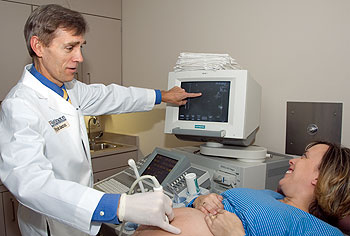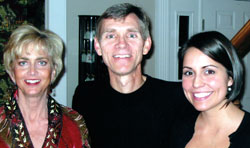In 2005, when Lisa Casciola was 18 weeks pregnant, she went to her obstetrician’s office for an ultrasound to find out if she was having a boy or a girl. Instead, the technician told her she saw something wrong and immediately referred Casciola and her husband, Allan, to Jeffrey Dicke, M.D., associate professor of obstetrics and gynecology and director of Obstetrics and Gynecology Ultrasound.

In a darkened ultrasound room, Dicke told the Casciolas and Lisa’s mother words that were hard to comprehend. The little boy’s lungs were filled with fluid, his abdomen was swollen, and no fluid could be found in the amniotic sac. The findings were consistent with a diagnosis of CHAOS (congenital high airway obstruction syndrome), a rare disorder. Dicke also told them that the prognosis for the baby was not good.
Although the Casciolas were devastated by the news Dicke delivered, they also were struck by his caring, direct manner.
“Everything he said we didn’t want to hear, but the way he said it was amazing,” says Casciola. “He was straightforward but gentle at the same time. Anything he said to me I could handle.”
Dicke referred the Casciolas to the Fetal Care Center of Cincinnati, where the Casciolas hoped in utero surgery could help their son. Instead, they received more bad news — he was not a candidate for fetal surgery.
On April 13, 2006, in Barnes-Jewish Hospital, Casciola delivered her son, whom they had named Benjamin. He was stillborn. Dicke visited Casciola after her delivery.
Three months later, Casciola became pregnant again, and, on March 17, 2007, she delivered a healthy girl, Maria. Dicke performed all of the ultrasounds during Casciola’s second pregnancy, and he also came to the hospital after Maria was born.
“We just love Dr. Dicke,” Casciola says. “He has to deliver bad news, but I always knew he was on my side.”
Gil A. Gross, M.D., associate professor of obstetrics and gynecology and one of Dicke’s colleagues, echoes Casciola.
“Jeff Dicke’s calm and professional demeanor puts patients at ease, especially during times of uncertainty,” he says. “And when I receive a report from Dr. Dicke, I am completely confident that my patient received the highest level of care even in the most difficult of clinical situations.”
Passion for science
Dicke, who grew up in a large family in the small town of Defiance, Ohio, was a studious child who liked school.
He and his four siblings learned a strong work ethic from their parents, who started their own business that sold oil, tires and batteries to trucking companies. Later, his father owned several gas stations. Dicke’s mother kept the books for the businesses in addition to caring for her large family.
Dicke says he began to think about going to medical school while he was in high school.
“I thought learning about the human body would be constantly stimulating,” he says. “I also thought that the relationship between doctor and patient would be different from interactions that people have in business or other occupations.”
|
Jeffrey Dicke |
|
What he likes about St. Louis: “People seem to be very attached to this area — most residents would never consider living anywhere else,” Dicke says. “I also like all the multigenerational families.” Last trip: Puerto Vallarta, Mexico. Dicke and his wife, Jan, take this trip every year with D. Michael Nelson, M.D., Ph.D., the Virginia S. Lang Professor of Obstetrics and Gynecology, and his wife, Peggy. Last movie seen: “In the Valley of Elah” |
After graduating from the University of Toledo with honors, Dicke attended Ohio State University College of Medicine. He realized in medical school that he wanted to specialize in obstetrics and gynecology.
“I was amazed by fetal development and the birth process, which are quite extraordinary,” he says. “I also thought it was remarkable that babies develop normally as often as they do.”
Most of Dicke’s clinical time is spent conducting gynecologic and obstetric ultrasounds. In gynecologic ultrasounds, he looks for tumors, fibroids and other problems. The obstetric ultrasounds involve prenatal diagnosis and prenatal procedures such as amniocentesis and chorionic villus sampling (CVS).
After conducting prenatal diagnosis ultrasounds, he spends a great deal of time talking to parents about the results, which can be challenging, he says.
“Women who become pregnant always anticipate that theirs will be a normal, healthy, happy outcome,” he says. “But I feel privileged, if there’s a problem, to provide them with accurate information, to discuss their options and to help them arrive at some sort of decision regarding the pregnancy.”
Dicke says patients are initially devastated, but he has learned that giving them enough information helps make the situation more tolerable.
“In addition to knowing a lot about fetal physiology, we’ve developed expertise in what a patient can expect in terms of the pregnancy, how it will affect labor and delivery, where she delivers and how she delivers,” he says.
Dicke conducts dramatically fewer amniocenteses and CVs than when he started in the field. Many moms now choose the first trimester screen or the quad screen, blood tests and ultrasound evaluations early in the pregnancy that identify the risk of Down syndrome and other chromosomal abnormalities. Through these tests, many mothers find out that their risks of having a child with chromosomal abnormalities are lower than they expected.
“More women have begun to rely on these noninvasive screens as opposed to invasive testing,” Dicke says. “Most people are looking for a reason not to do a procedure.”
The next generation
Dicke also is known as a natural educator of students, residents and fellows. “He’s very patient with trainees and is an excellent role model for everyone,” says D. Michael Nelson, M.D., Ph.D., the Virginia S. Lang Professor of Obstetrics and Gynecology, who recruited Dicke to the School of Medicine in 1987.

Dicke says working with the people who will become the next generation of obstetricians and gynecologists is an important and rewarding part of his job.
“I get great satisfaction in training others to give excellent care,” he says. “One reason is that when someone calls me with a patient to refer, I can tell within a minute whether they’ve been trained well or not.”
With colleagues in the maternal-fetal division, he also is studying the expected outcome of fetal kidney and renal disorders and how best to diagnose and monitor growth-restricted fetuses.
In addition to his demanding work schedule, Dicke is committed to an intense fitness regimen, getting up at 4:30 a.m. each morning to ride his bike and run.
He and his wife, Jan, are the parents of a 26-year-old daughter, Erin, who manages residential downtown properties for Rodemyer-Christel Inc. in St. Louis.
He also is a big fan of The New Yorker magazine, which his parents have renewed for him every year since he was in college. And he is known among his colleagues for his dry sense of humor and his knowledge about diverse topics, ranging from cars to fountain pens.
George A. Macones, M.D., head of the Department of Obstetrics and Gynecology, says Dicke has a record of excellence and is an integral part of the department.
“He is an accomplished clinician, wonderful educator, and his units provide world-class service in prenatal diagnosis,” he says. “We are fortunate to have him as director of our ultrasound division.”